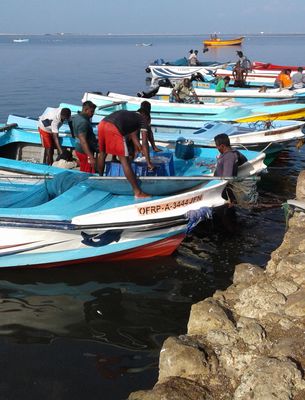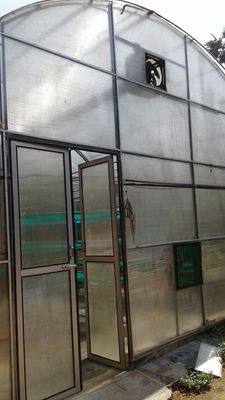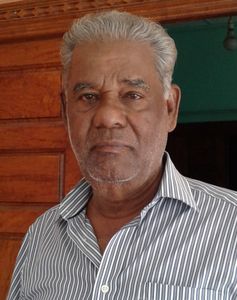ON A SUNNY MORNING, Sangarapillai Naguleswaran is busy overseeing production at his small factory in Kopay, 10km from Jaffna town. Yam, drumstick leaves, neem flowers, bitter gourd and fruits shrivel in several solar greenhouse dryers, to be turned into instant rasam mix and ready-to-fry vadas, or simply powdered for use in soups and curries. Packaged, the products are sold in grocery stores in Colombo. The factory, set up with assistance from international agencies, employs a few local people, including the owner’s two daughters.
“In the 1970s, agribusiness boomed here, and Jaffna was a leader in exporting mango products,” says Naguleswaran, who learnt the art of preservation in Kerala in the early 1980s. “Jaffna led the way in food preservation technology,” he says, claiming that a popular fruit juice brand in Sri Lanka was started in the 1960s by a Jaffna food preservation expert, who later sold the company to a Sinhalese businessman who rebranded it.
The 26-year Civil War, which began in 1983, killed Jaffna’s industries. After the war ended in 2009, small businessmen like Naguleswaran have worked to pick up the pieces, hardly bothering about political cataclysms in Colombo or Jaffna.
Almost every person one meets in Jaffna is least interested in discussing politics, their conversations veering towards economic growth and development. Tamil politicians, they say, are keen on continuing the Sinhala-Tamil divide for political gains.
Politics in Jaffna is largely dominated by C.V. Vigneswaran, whose term as chief minister of the Northern Province ended in October; the province is under president’s rule. He has been toeing an ultranationalistic line, even objecting to business affiliations with the south, and his party, the Tamil National Alliance, campaigns for wartime accountability, the release of Tamil political prisoners, and a new constitution to devolve power to the Tamils. There is a general feeling that the TNA politicians live luxurious lives and are not really interested in the development of the province.
In Jaffna town, Santhan (name changed), a retired government official, is holding a meeting to float a political party that will “think of the prosperity of Jaffna” rather than stress ethnic divisions. “Somewhere, we have got it all wrong,” says Santhan. “We blindly trusted our leaders and lost out on economic and human development.”
In contrast, the east—home to a large Muslim population, also considered a minority like the Tamils—has been developing rapidly.
A key factor in the rapid development of the east is the creative entrepreneurial stimulus that comes with close cohabitation of all three ethnic communities: Tamils, Muslims and Sinhalese, says A.R. Jeyamanon, senior deputy director at the Jaffna branch of Sri Lanka’s Board of Investments. (Jaffna is mostly Tamil.) “I was posted in Trincomalee 15 years ago, and on a recent visit, I was amazed at how developed it is, with an extremely robust private sector propelled by the Muslims, Tamils and Sinhalese,” says Jeyamanon. “There is healthy competition and interaction, which boosts initiatives.”
He says that politicians in the north should promote the economy and welcome investment and business affiliations from the rest of the country. “We have opened the doors to investors and welcomed southern investment,” says Jeyamanon. “Doing business with the south is the best way to promote reconciliation.”
In the fishing village of Pasaiyoor in the Colombathurai suburb of Jaffna, fishermen are playing cards after a hard day’s work in the lagoons. One of them, Augustine Francis, 67, says that since the war ended, there has been an increasing pressure on natural resources in the area. “Twelve years ago, there were only 35 boats; now there are 350 boats,” says Francis. “We used to bring boatloads of fish, especially prawns. Now we catch only small quantities, which are sometimes too meagre to be sold. We really do not know why there are no fish anymore. It could be because of excessive trawling, or climate change, but our incomes are continuously decreasing.” He says that from his village, like most villages in Jaffna, at least one member from almost every family, fled to Europe during the war. “Most of them are struggling financially in their new homes abroad.” he says. “However, every small assistance from them helps.”
In Jaffna town, I join a group of young women for tea. They work in a government institution. All of them are college graduates, most of them postgraduates. They are discussing dowries. Several of them have lost their parents or brothers in the war or to illness. One of them says she has collected Rs15 lakh towards her dowry, by saving the bulk of her salary and stinting on food. But, she says, prospective grooms expect Rs50 lakh and a car.
Her colleagues have similar stories. Those who have brothers say the pressure is on them to collect dowries for their sisters. Their boss, a Sinhalese man, walks in and jokingly asks if it is the usual conversation. “Come to the south and marry our Sinhalese boys; they don’t expect dowries,” he tells them. They smile shyly, saying that their relatives would never agree.
They say things were different during the war. When the Liberation Tigers of Tamil Eelam ruled the north with an iron fist, dowries were banned, as was caste segregation. “Now, most men insist on dowries, and a person’s caste is of pivotal importance,” says one of the women. “We have graduates, but no jobs. The politicians are unaware of our problems. They want to hold on to power, and talk about what they want, not what we want.” The women stress the need for more female Tamil politicians.
As the sun sets, they hope for harmony and opportunities to grow.




